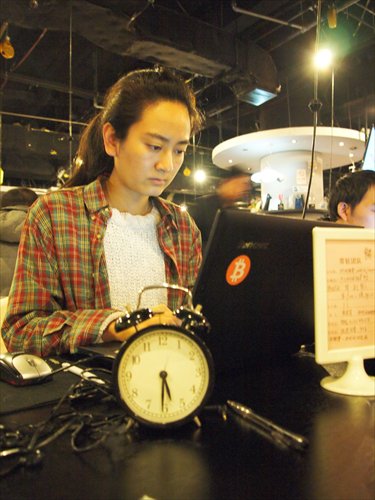Time is money

Luo Fan, co-founder of online auction house Time Sale, at The Garage Café in Zhongguancun, Haidian district. Photo: Li Ying/GT
Online auction house Time Sale's team (left to right) Luo Fan, Zhang Diqi and Li Mengqi. Photo: Courtesy of Zhang Diqi
Chen Tianming had a spring in his step as he made his way to a small café near Renmin University of China to have perhaps the most expensive cup of coffee of his life. Upon arriving at the café, the mustachioed man dressed in a smart suit spotted his waiting companion.
Chen, CEO of online-to-offline (O2O) custom-made gifts startup youlipin.com, had paid 515 yuan ($85) as the winning bid of a time-sale auction. His prize? A coffee date with Zhang Jidong, creative director and co-founder of leading Beijing advertising agency Wax Apple Communication.
Chen purchased his time with Zhang, 31, at shijianpaimai.com, an online auction house known in English as Time Sale.
The concept of high-profile people selling their time to the public gained traction in June 2013, when American finance tycoon Warren Buffett auctioned a dinner with him for $1 million as part of a charity fundraiser.
In China, time sales have presented a unique opportunity for young entrepreneurs like Chen to socialize and learn from the expertise of business movers and shakers like Zhang.
"More than 10 years' experience in media and advertising. Hope to talk to excellent people, exchanging ideas regarding advertising, media communications and micro films," Zhang advertised in his Time Sale classified.
A month after the winning bid was made, Zhang said it "felt good" to finally be sitting face to face with his mystery protégé.
"We shared ideas on O2O marketing strategies over the more than two hours we were together for coffee," Zhang said.
Origins and development
Time Sale is not the first company to tap the commercial business socializing market. Wang Lifen, founder of umiwi.com, a website that provides business training and mentorship courses to enterprises, launched China's first auction of business leaders' time in 2010.
Wang, the former host of China Central Television startup reality show Win in China, used Shi Yuzhu, former CEO of the New York Stock Exchange-listed online gaming company Giant Interactive Group, as the first celebrity whose time was auctioned.
In 2010, a three-hour appointment with Shi was sold for 1.9 million yuan. In 2012, the price tag rose to 2.13 million yuan for the same amount of time. In other auctions overseen by Wang, a bidder clinched a date with real estate tycoon Ren Zhiqiang for 450,000 yuan. All proceeds of the three sales went to charity, said Wang.
Time sales in China typically target grass-roots entrepreneurs hoping to benefit from spending time with experienced, successful moguls.
"Startup entrepreneurs want to learn from the experiences of business insiders," said Zhang Diqi, 31, CEO of Time Sale. "For bidders, they are showing their sincerity to auctioned business figures by outlaying substantial sums of money."

Entrepreneurs learn tips
Zhang Diqi and Luo Fan, both graduates of the Communication University of China, are co-founders of Time Sale. While working at The Garage Café, a hangout for startup founders in Beijing's science and technology hub Zhongguancun, they came up with the idea of helping green entrepreneurs connect with experienced mentors.
"Having experienced failures in trying to start our own business, we understand how important it is to learn from experiences of the right people," said Zhang Diqi, a soft-spoken man with a shaved head and goatee.
Founded in early 2013, the website has organized about 250 auctions. The most popular people who have sold their time are senior executives of mid-sized companies, venture capital investors and people with marketing and media expertise.
Among the 20 current people whose time is being auctioned on the website are Su Juan, business writer and founder of women's lifestyle website shelive.net, whose time is currently priced at 989 yuan; Ah Xi, an angel investor and head of the California branch of The Garage Café, whose time has a reserve of 500 yuan; and Zhao Lei, a barista whose reserve is 55 yuan for a coffee date in which he will serve three different types of coffee to the winning bidder.
One of the most popular people auctioning their time is Shi Rong, an investment analyst who has made seven past dates with winning bidders for an average price of 300 yuan.
"Time Sale takes a commission [of the final auction price] of usually around 20 percent. Most of the time, sellers donate the remaining proceeds to charity," said Zhang Diqi.
Level communication platform
Yang Yongqing, a garment company founder, said he has learned about various useful experiences from time sellers.
Yang has met five people through time-sale auctions. One of his most productive dates was with Zhao Jian, director of Hit FM on China Radio International, which lasted about six hours.
"We chatted for so long we hardly had time for lunch," Yang recalled, saying the pair talked about how traditional industries can survive and develop in the Internet era and how Yang could best market clothes with traditional Chinese patterns among young people.
During Yang's meeting with Wu Qiang, former vice president of finance management software makers Kingdee and Yonyou, the duo shared ideas about company operations and effectively raising venture capital. "The different ideas inspired me a lot. It was like brainstorming for me," said Yang, adding he will keep bidding for more business leaders priced under 2,000 yuan.
Nevertheless, challenges and questions about Time Sale exist. One question is why people still value a face-to-face chat in the digital era when connecting with celebrities and experts from all sectors is just a mouse click away on social networking websites.
"Today, we can send messages to strangers via [microblogging service] Weibo or add someone as a friend on [instant messaging service] WeChat, but there is a high chance your target will ignore you," said Zhang Diqi.
"The way of using money to secure time with someone for the purpose of communication is useful. The outlay makes both parties equals."
Zhang Diqi launched Time Sale because he considered it a fresh method in business socializing different from generic social networking websites.
"Time Sale is accepted by middle-class, white-collar workers who hope to develop their business contacts," Zhang Jidong said, adding he believes it provides good value to bidders because business leaders whose time is purchased always communicate effectively to provide value for money.
Talk isn't always cheap
Liu Shuopei, vice director of the instant messaging department of Chinese Internet giant Tencent, believes the time sale business model in China still requires much development.
Liu has auctioned his time twice in the past.
"Time sales can be categorized as an industry that provides service and assistance to startup entrepreneurs. The future of it is to serve as a startup incubator," Liu said.
In China, websites offering similar services include dijiuke.com, a social networking platform where people can launch public courses, and demohour.com, a crowdfunding website that helps startups raise capital.
The idea of selling time is already catching on in China. One of Zhang Diqi's original Time Sale partners went rouge by establishing a rival company using the same principle to arrange dates for men with women.
Even Wang's auctions of celebrities' time have attracted controversy, with critics questioning the transparency of umiwi.com and its legitimacy in organizing such auctions. Umiwi.com did not reply to interview requests from Metropolitan by press time.
Billionaire recycling tycoon Chen Guangbiao, who is bidding to buy The New York Times, claimed on Sunday that "there's nothing that can't be bought for the right price," but Zhang Diqi was coy when asked if Time Sale embraced the same philosophy.
"A person's time is limited and should be cherished. The significant thing in life is not who you are but who you know," he said. "I want to use Time Sale to remind people about the value of seconds, minutes and hours that slip from our figures."